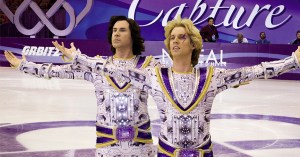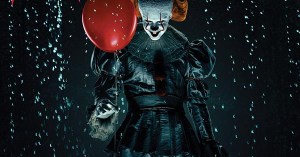Trekking With Tim, Day Ten: Star Trek: Nemesis
Editor Tim Ryan is disappointed by the turn the franchise has taken.

Day Ten: Star Trek: Nemesis
Talk about a franchise in need of a reboot. Star Trek: Nemesis is hardly laughable; it’s just not very compelling. This is certainly the dullest entry in the series, lacking even the camp value of The Final Frontier. It’s not a complete waste of time; the visuals are occasionally striking, the actors are game, and there are periodic flashes of wit. However, this is the only Trek movie I’ve seen that felt redundant — Nemesis never justifies its existence, and it finds this series taking a sad slide toward irrelevancy.
Which is a shame, not only because I’ve come to like the Next Generation crew, but also because it’s unlikely we’ll see their likes again — on the big screen, at least. There’s something refreshing about the fact that most of the Enterprise‘s inhabitants don’t look like classic movie stars, and that a whole sci-fi franchise was based around the cerebral rather than the visceral. However, Nemesis ditches the Big Thoughts in favor of more straightforward action fare — and stumbles badly as a result.
The movie opens with a meeting of the Romulan senate, the members of which are debating the merits of opening relations with their lower-caste neighbors, the Remans. However, a deadly chemical is unleashed , killing everyone in the chamber. Meanwhile, the Enterprise crew is celebrating the wedding of Will Riker and Deanna Troi, who will be heading up their own ship once they get to Deanna’s home planet of Betazed. It’s a nice scene, as Picard gives a heartfelt toast to his old colleagues and Data sings a convincing rendition of “Blue Skies” (which sets up the film’s best line, in which a drunken Worf grumbles disdainfully, “Ugh… Irving Berlin!”)
[rtimage]MapID=10000621&MapTypeID=2&photo=24&legacy=1[/rtimage]
Naturally, the good vibes can’t last. Once the crew begins its journey, it’s waylaid by a mysterious reading from a desert. Picard, Data, and Worf head down to investigate, and find the scattered pieces of an android that appears to be a prototype of Data. However, our heroes are immediately attacked by a group of sand people, which sets up a dull humvee chase that bodes poorly for the film; what’s this standalone action scene doing here? (It doesn’t help that the washed-out cinematography looks self-consciously arty; Steven Soderberg used a similar look in Traffic‘s south-of-the-border scenes to greater effect.)
Subsequently, the Federation tells Picard to go to Romulus, where Shinzon (Tom Hardy) has taken over power after eliminating the senate. Though he bares a remarkable resemblance to Nosferatu, Shinzon is actually a clone of Picard, though an imperfect one. He suffers from a variety of ailments, and though he speaks diplomatically to the Enterprise crew about intergalactic peace, his motives seem sinister. It turns out he was enslaved by the Romulans, and his plan is to establish a new galactic power order, using a potent weapon to destroy Earth, and with it, the Federation.
[rtimage]MapID=10000621&MapTypeID=2&photo=26&legacy=1[/rtimage]
OK, so with two Datas and two Picards running around, we’ve got a nice little meditation about the yin and yang of human (and android) personality and singularity, right? Nope. The Data clone subplot is never fully explored, and the tension between Picard and Shinzon feels secondhand; we’re never fully convinced that these two share the same DNA, and it doesn’t help that their physical resemblance is hardly striking.
In the annals of Star Trek villains, Shinzon is relatively nondescript. He glowers well enough, but he’s unconvincing as a would-be master of the universe; he barely seems to preside over an empire, as his crew is strangely under-populated, save for a couple loyal Remans. In addition, it’s revealed that Shinzon is a defective clone, and that his body is rapidly breaking down (a comment on the plight of Dolly the sheep, perhaps? Maybe). In other words, why not just wait him out? Things get even sillier as the Enterprise goes to war with Shinzon’s ship. Is it really possible that the Enterprise could simply ram into another craft and survive? And how poignant is the death of a beloved character (in this case, Data) if he has a clone that contains all his memories?
[rtimage]MapID=10000621&MapTypeID=2&photo=25&legacy=1[/rtimage]
Look, don’t get me wrong. Nemesis looks just fine; after the hit-and-miss aesthetics of Insurrection, this at least doesn’t have the feel of a TV show. But the script is dull, and the conflict is barely existent; this movie just seems to be going through the motions. It’s too bad, because I don’t believe the Next Generation ever got to prove its cinematic mettle; The Next Generation had a longer run on TV than its predecessor, but the movies it inspired (one excellent, one decent, and two thoroughly mediocre), don’t measure up to the Kirk-Spock incarnation.
Tomorrow, we conclude our series with the brand new Star Trek. Does it boldly go where no Trek film has gone before? Will it live up to its impressive Tomatometer ranking?
Stardates:
- Day One: Star Trek: The Motion Picture (1979)
- Day Two: Star Trek: The Wrath of Khan (1982)
- Day Three: Star Trek III: The Search for Spock (1984)
- Day Four: Star Trek IV: The Voyage Home (1986)
- Day Five: Star Trek V: The Final Frontier (1989)
- Day Six: Star Trek VI: The Undiscovered Country (1991)
- Day Seven: Star Trek: Generations (1994)
- Day Eight: Star Trek: First Contact (1996)
- Day Nine: Star Trek: Insurrection (1998)
- Day Ten: Star Trek: Nemesis (2002)
- Day Eleven: Star Trek (2009)






